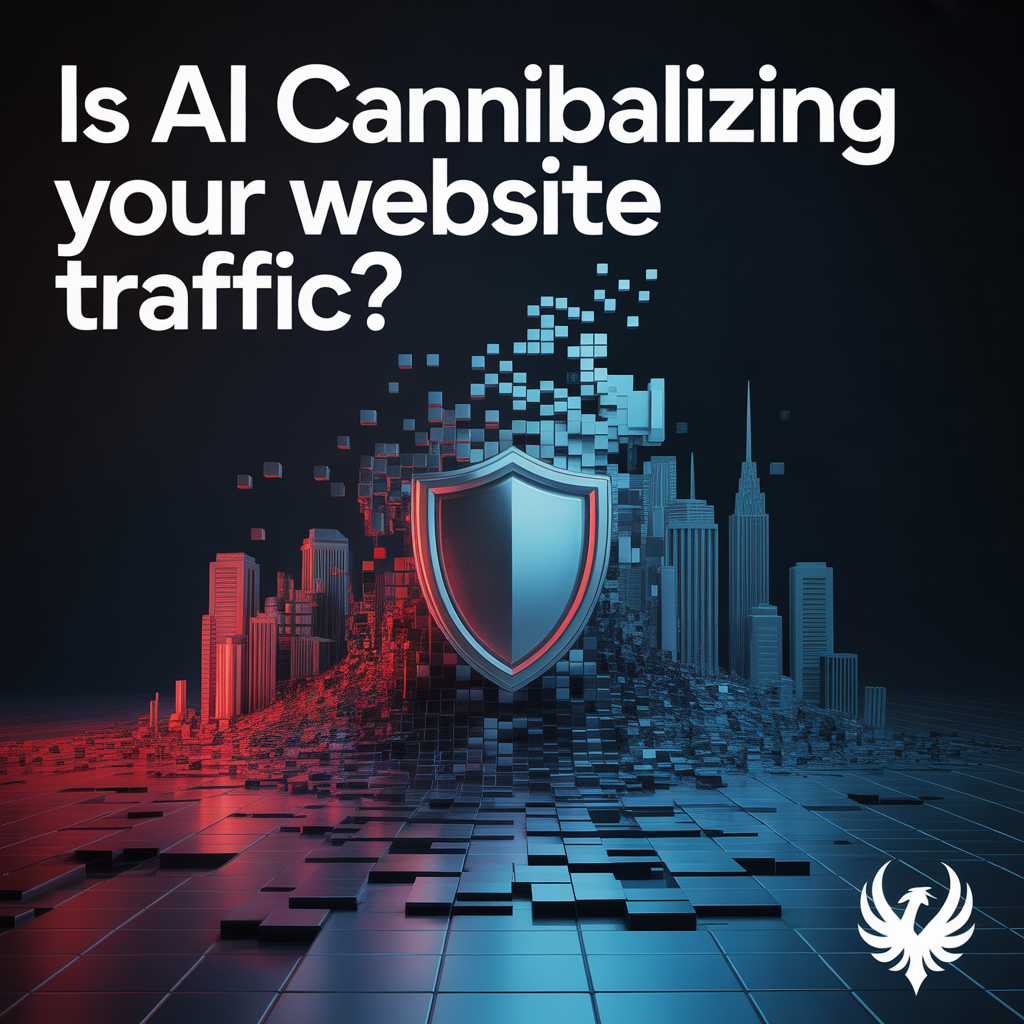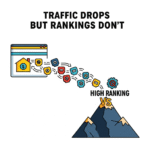
Is AI Cannibalizing Your Website Traffic?
You notice the pattern gradually at first, then all at once. Your content still ranks well for target keywords, but traffic keeps declining month after month.
Users are finding your information, but they’re not visiting your website to read it. Something is intercepting your audience between the search query and your content.
That something is artificial intelligence, and it’s quietly reshaping how people consume information online.
AI tools are reading your articles, digesting your expertise, and serving summarized versions to users who never need to visit your site.
Your years of content creation have become training data for systems that compete directly with your traffic.
Google’s AI Overview feature appears above traditional search results, pulling information from multiple sources to create comprehensive answers.
Your article about sustainable gardening techniques contributes to an AI-generated response that covers soil preparation, plant selection, and watering schedules.
Users get everything they need from the overview without clicking through to read your full guide.
ChatGPT and similar AI assistants answer questions using knowledge that includes information from your published content.
Users ask about topics you’ve covered extensively, and the AI provides detailed responses that synthesize your insights with information from other sources.
Your expertise becomes part of a collective intelligence that doesn’t attribute traffic back to you.
Voice assistants pull answers from your content to respond to spoken queries.
When someone asks Alexa about your area of expertise, they might receive information that originated from your website, but the interaction ends there.
No click-through, no website visit, no opportunity for you to build a relationship with that potential reader.
AI-powered research tools summarize entire industries worth of content into digestible reports.
Your analysis of market trends gets incorporated into AI-generated summaries that business professionals read instead of seeking out original sources.
The tools provide citations, but users rarely follow them back to the source material.
Browser extensions and AI writing assistants help users get quick answers without visiting websites.
Someone researching your topic can highlight a paragraph and ask an AI tool to explain or expand on the concept.
The AI draws from its training data, which likely includes your content, to provide explanations that keep users on their current page instead of directing them to yours.
Social media platforms integrate AI features that answer user questions directly within their interfaces.
LinkedIn’s AI assistant can provide professional advice that incorporates insights from your thought leadership articles, but users never leave LinkedIn to engage with your original content.
Search engines beyond Google are implementing their own AI answer features.
Bing’s copilot integration, DuckDuckGo’s instant answers, and other search platforms are moving toward providing direct responses rather than link-based results.
Your content feeds these systems, but the traffic doesn’t flow back to you.
Educational platforms use AI to create course materials and study guides that synthesize information from expert sources like your content.
Students get comprehensive learning materials without ever visiting the original websites where the information was published.
Your expertise becomes educational content that you don’t control or benefit from directly.
News aggregators and content curation tools use AI to create summaries that give readers the key points from multiple sources.
Your in-depth analysis gets reduced to a few bullet points in a roundup that satisfies reader curiosity without driving engagement with your original work.
Email newsletters powered by AI digest industry information and present it to subscribers in convenient formats.
Your latest insights might be included in someone else’s newsletter, reaching audiences that would have originally found that information on your website.
The pattern affects different types of content differently.
How-to guides and instructional content suffer the most because AI can effectively summarize step-by-step processes.
Opinion pieces and analysis fare slightly better, but even those get synthesized into broader perspectives that don’t require reading the original source.
Users have developed new information consumption habits that bypass traditional website visits.
They’ve learned that they can get quick answers from AI tools without navigating through multiple websites, reading full articles, or dealing with ads and email signup prompts.
The friction of visiting individual websites feels unnecessary when AI provides immediate, comprehensive responses.
The democratization of AI tools means that anyone can quickly research topics that would have previously required visiting multiple expert websites.
A business owner researching marketing strategies can get comprehensive advice from an AI assistant in minutes, incorporating insights from dozens of marketing experts without visiting any of their websites.
Content creators face a paradox where their expertise becomes more valuable to AI systems while becoming less valuable for direct audience building.
The information you publish feeds the intelligence of systems that compete with you for reader attention and engagement.
This shift represents more than just a change in traffic sources. It’s a fundamental transformation in how information flows from creators to consumers.
The direct relationship between content creators and their audiences is being mediated by AI systems that aggregate, synthesize, and redistribute knowledge.
Your content still has value and influence, but that value is increasingly captured by AI platforms rather than flowing back to you through website traffic, email signups, and direct audience relationships.
The expertise you’ve built over years gets incorporated into systems that don’t share the economic benefits of that knowledge.
The trend is accelerating as AI tools become more sophisticated and users become more comfortable relying on them for information.
Each month, more queries get answered by AI systems instead of directing users to original sources.
The portion of your potential audience that AI intercepts continues to grow.
You’re not imagining the traffic decline, and you’re not failing at content marketing.
You’re experiencing the early stages of a fundamental shift in how information gets distributed and consumed online.
Your content is still reaching people, but the path between your expertise and your audience has changed in ways that don’t benefit you directly.






